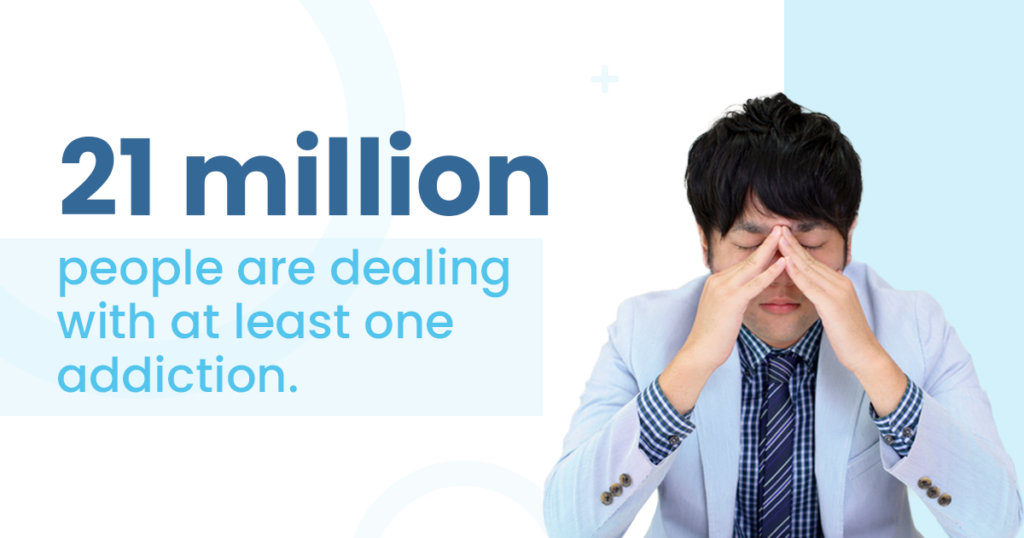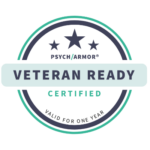
Individuals struggling with a substance use disorder often have a strong desire to end their addiction and will attempt to do so to no avail. Most of the time, this is because of the uncomfortable and dangerous withdrawal symptoms of quitting a substance.
These symptoms may include headaches, shaking, irritability, anxiety, etc. Withdrawal symptoms are challenging to handle, and severe mental and physical changes can make it a painful experience which causes many addicts to give up on the recovery process.
The severity of these symptoms can depend on the substance you abstain from and your dependence on it.
Substances like alcohol and drugs affect the brain’s neurotransmitters and cause changes to dopamine and serotonin levels which can directly affect your mental health. Artificially elevating these levels may cause euphoric effects for a short period of time, but doing so can also cause these levels to crash suddenly once the substance wears off.
Some drug withdrawals can bring life-threatening consequences, but it varies from person to person; many people face problems. Those with a severe dependence on drugs or alcohol may experience more serious withdrawal symptoms like hallucinations or seizures and require proper controlled medication for treating alcohol withdrawal. Frequent physical symptoms include tremors, nausea, and stomach cramps.
Side Effects of Quitting “Cold Turkey”
The unpleasant withdrawal symptoms can be problematic if you suddenly stop drinking. It is essential to seek professional help when attempting to quit drinking or using drugs, as you are more likely to succeed with the proper treatment and a proper support system. Medical detoxing can provide a smooth recovery from addiction without letting you face the hardships of withdrawal.
Symptoms of Withdrawal Vary Between Substances
When it comes to signs of discomfort, one can experience various symptoms based on the substance they choose to leave behind. Substances such as alcohol, tranquilizers, and opiates typically cause physical withdrawal symptoms such as headaches or sweating. Other substances like marijuana, and cocaine, cause emotional withdrawal symptoms like irritability and insomnia.
Withdrawal From Alcohol and Anti-depressants
Quitting the use of medications such as sleeping medications and anti-depressants such as benzodiazepines and barbiturates. The withdrawal symptoms of alcohol are similar to these medications and can also cause many adverse effects on one’s health.
Below are some of the most common withdrawal symptoms of quitting anti-depressants or alcohol
- Shakiness
- Seizures
- Insomnia
- Clammy skin
- Nausea and Vomit
- Tremors and hallucination
- Enlargement of Pupils.
- Loss of appetite
Withdrawal From Opioids & Opiates
Withdrawals from opioids and opiates are quite different from other substances. For example, withdrawal symptoms of heroin can begin within just 12 to 14 hours, and these effects of withdrawal comedown after 5 to 7 days.
You can receive opioid treatment to overcome the symptoms, whereas Methadone will have an impact after 36 hours of taking the last dose, and its withdrawal can subside for more than three weeks.
Below are common symptoms of quitting opioid use:
- Stomach cramps
- Rapid heart rate
- Thoughts of suicide
- Tremors or muscle twitching
- nausea, vomiting, or diarrhea
- Goosebumps, chills, or sweating
Cocaine Withdrawal
The emotional symptoms of cocaine withdrawal include a depressed mood, vivid dreams, and discomfort. If a person struggles with withdrawal, they may face heavy agitation and depression for over a month since their last use. You can achieve recovery with cocaine treatment from an addiction facility.
Importance of Detoxification
Detoxification is the process by which the body eliminates synthetic substances, restoring a natural balance. Detox is necessary for a smooth recovery process since the body must cut any remaining traces of a substance after use has ceased.
Among the objectives of medical detoxification is managing symptoms for a more comfortable recovery process. Over-the-counter or prescription medications are also used during medical detox to help combat cravings and withdrawal symptoms. It is always best to seek guidance from a medical professional whenever you plan to detox from a substance.
Treatment for Substance Abuse
The withdrawal symptoms can be bothersome, so you must seek medical assistance from a health care professional before quitting drinking. A detoxification and evidence-based therapies can be proven helpful in dealing with disposing of the effects and parts of drugs and substances excreted from your body.
After undergoing a detoxification process, treatment programs like behavioral therapies, support groups, and medication-assisted treatment make the recovery experience easier.
Frequently Asked Questions
What are possible withdrawal symptoms?
There can be many hazardous withdrawals, from high body temperature, hand tremors, and seizures to cognitive loss.
How long do withdrawal symptoms last?
Generally, withdrawal symptoms last around 3 to 7 days, but the exact time period and severity of symptoms depend on the substance you are quitting. For instance, withdrawal from substances such as cocaine can last up to 1 month.
What should I do if I have withdrawal symptoms?
If you are experiencing withdrawal symptoms due to quitting a substance, you should seek guidance from medical professionals. Treatment typically begins with a detoxification process where you rid the substance from the body. After this, you may attend behavioral therapies, and support groups and receive medication from a doctor that eases symptoms and cuts cravings.
How does it feel to have withdrawal symptoms from drugs?
Withdrawal symptoms from drugs can be incredibly uncomfortable, which is why it is recommended that you seek professional help before getting started.
A Facilitated Journey to Recovery awaits you at Haven Detox-South Florida.
At The Haven, our team of healthcare professionals is dedicated to helping patients overcome their addiction in the most comfortable way possible. We offer effective inpatient programs with medical supervision, including a detox process, behavioral therapies, and medication that eases withdrawal symptoms and combats cravings.
If you or a loved one are struggling with a substance use disorder, The Haven is here to help. Contact us today to learn more.






